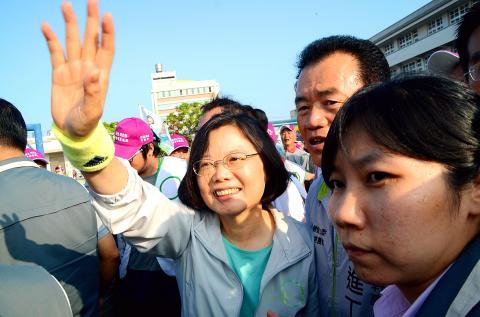Democratic Progressive Party (DPP) presidential candidate Tsai Ing-wen (蔡英文) yesterday said that she was disappointed with the outcome of a meeting between President Ma Ying-jeou (馬英九) and Chinese President Xi Jinping (習近平).
“We regret that the only result of the Ma-Xi meeting is the use of politics to limit the choices of the Taiwanese public regarding cross-strait relations on an international stage,” Tsai told a news conference in Yunlin County’s Douliu City (斗六) during a stop in her central Taiwan campaign trip.
“This morning, we expected him to do three things for the people of Taiwan: confirming the ability for the 23 million people of Taiwan to make their own choices; establishing that there would be no political preconditions in the development of cross-strait relations; and ensuring equal footing and dignity in cross-strait relations. However, he did not accomplish any one of those three objectives,” she added.

Photo: Yen Hung-chun, Taipei Times
Tsai said that she was very disappointed after watching the live TV coverage of the Ma-Xi meeting in Singapore, adding that Ma departed yesterday morning as the public questioned his decisionmaking and returned with only more controversy.
“The Taiwanese public will not accept a political framework that lacks democratic procedures and the support of public opinion,” Tsai said.
“I am confident about Taiwan’s democracy and people, and I will work with the people of Taiwan in a more democratic way to make up for the damage caused by the Ma-Xi meeting,” she added.
Prior to the event, Tsai said that the Ma-Xi meeting was not a “historical meeting” as Ma had claimed, but rather only a “newsworthy meeting.”
Meanwhile, DPP caucus whip Ker Chien-ming (柯建銘) was harsher in his criticism of the meeting, accusing Ma of “kowtowing and surrendering” to Xi during the event.
“Ma said in front of Xi that the ‘1992 consensus’ is an agreement on ‘one China’ reached in November 1992, meaning that he has abandoned his long-claimed stance of the ‘1992 consensus’ is ‘one China, different interpretations,’” Ker said. “That was the president of the Republic of China [ROC] openly denouncing the ROC at an international event; a serious setback for Taiwan’s sovereignty.”
Ma’s actions are the equivalent of “kowtowing and surrendering. We cannot accept such remarks, and express our strong protest against them,” Ker added.
Meanwhile, Taiwan Solidarity Union Chairman Huang Kun-huei (黃昆輝) was also critical of Ma’s remarks on the “1992 consensus” made during the meeting, saying that Ma only proved that his previous definition of the “1992 consensus” was a lie.
Ma echoing Beijing’s call for “one China” and agreeing with Xi’s opposition to Taiwanese independence are unforgivable, Huang added.
“Ma has further limited the next generation’s choices regarding Taiwan’s future,” Huang said. “That is an unforgivable crime.”

CHAOS: Iranians took to the streets playing celebratory music after reports of Khamenei’s death on Saturday, while mourners also gathered in Tehran yesterday Iranian Supreme Leader Ayatollah Ali Khamenei was killed in a major attack on Iran launched by Israel and the US, throwing the future of the Islamic republic into doubt and raising the risk of regional instability. Iranian state television and the state-run IRNA news agency announced the 86-year-old’s death early yesterday. US President Donald Trump said it gave Iranians their “greatest chance” to “take back” their country. The announcements came after a joint US and Israeli aerial bombardment that targeted Iranian military and governmental sites. Trump said the “heavy and pinpoint bombing” would continue through the week or as long

TRUST: The KMT said it respected the US’ timing and considerations, and hoped it would continue to honor its commitments to helping Taiwan bolster its defenses and deterrence US President Donald Trump is delaying a multibillion-dollar arms sale to Taiwan to ensure his visit to Beijing is successful, a New York Times report said. The weapons sales package has stalled in the US Department of State, the report said, citing US officials it did not identify. The White House has told agencies not to push forward ahead of Trump’s meeting with Chinese President Xi Jinping (習近平), it said. The two last month held a phone call to discuss trade and geopolitical flashpoints ahead of the summit. Xi raised the Taiwan issue and urged the US to handle arms sales to

BIG SPENDERS: Foreign investors bought the most Taiwan equities since 2005, signaling confidence that an AI boom would continue to benefit chipmakers Taiwan Semiconductor Manufacturing Co’s (TSMC, 台積電) market capitalization swelled to US$2 trillion for the first time following a 4.25 percent rally in its American depositary receipts (ADR) overnight, putting the world’s biggest contract chipmaker sixth on the list of the world’s biggest companies by market capitalization, just behind Amazon.com Inc. The site CompaniesMarketcap.com ranked TSMC ahead of Saudi Aramco and Meta Platforms Inc. The Taiwanese company’s ADRs on Tuesday surged to US$385.75 on the New York Stock Exchange, as strong demand for artificial intelligence (AI) applications led to chip supply constraints and boost revenue growth to record-breaking levels. Each TSMC ADR represents

State-run CPC Corp, Taiwan (CPC, 台灣中油) yesterday said that it had confirmed on Saturday night with its liquefied natural gas (LNG) and crude oil suppliers that shipments are proceeding as scheduled and that domestic supplies remain unaffected. The CPC yesterday announced the gasoline and diesel prices will rise by NT$0.2 and NT$0.4 per liter, respectively, starting Monday, citing Middle East tensions and blizzards in the eastern United States. CPC also iterated it has been reducing the proportion of crude oil imports from the Middle East and diversifying its supply sources in the past few years in response to geopolitical risks, expanding